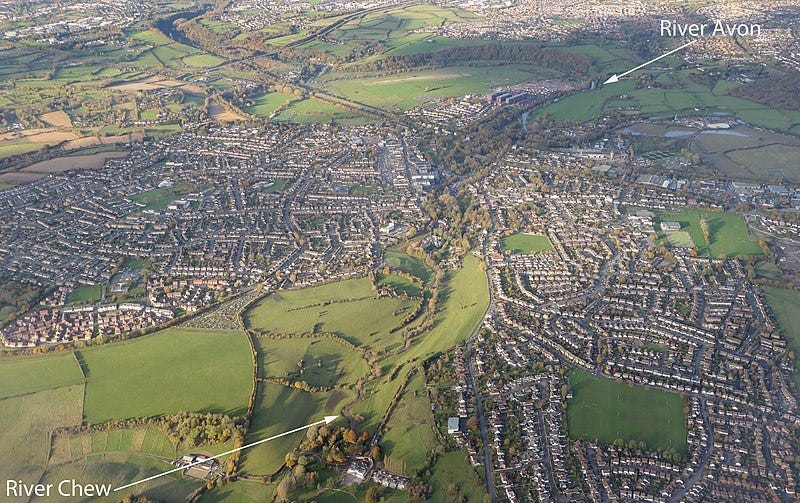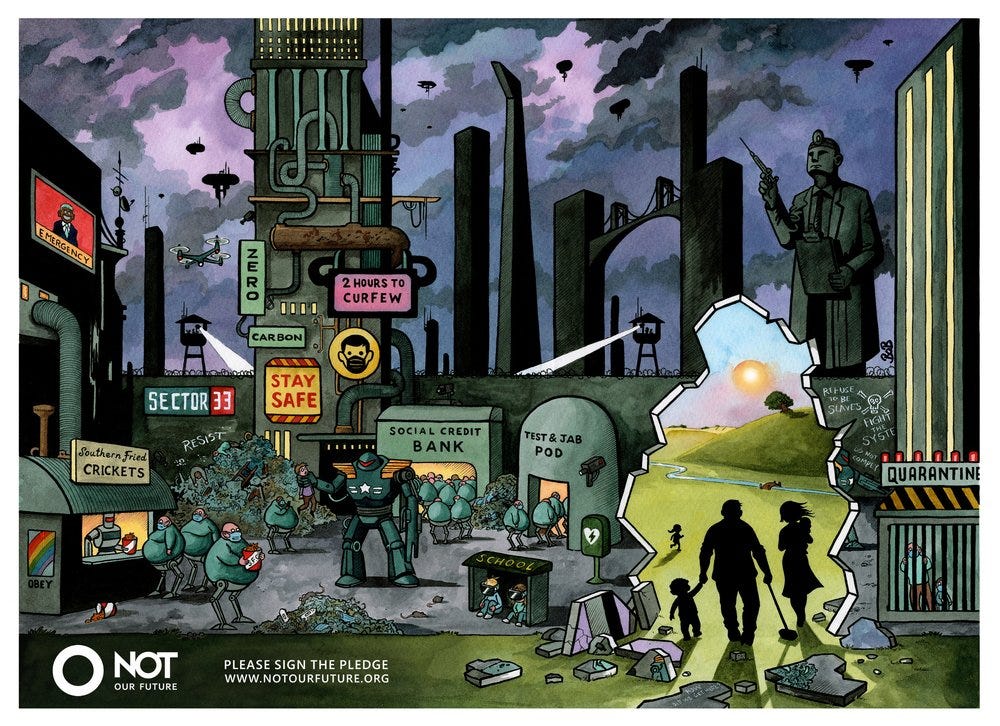Where we stand on 15 minute neighbourhoods
'15 minute neighbourhoods/cities' is a concept that has generated a lot of controversy. In part, that's down to what to a fair few people may seem like a sound idea being rolled into the very dubious and quite sinister concept of the 'smart city'. What we want to try to do with this brief piece is start to tease apart on the one hand, the aspiration to have as many of life's amenities as possible within a fifteen minute walk and on the other hand, so called 'smart cities' where are basically, surveillance and control central.
Our search for a fifteen minute neighbourhood
The two of us behind this project don't drive. We get around by walking and using public transport, both train and bus. As non drivers, understandably we very much like the idea of having a lot of life's amenities within a fifteen minute walk of where we live. When we were researching relocating from Thurrock down to the Bath/Bristol area, our criteria for a suitable location was having needs based shopping, a library, doctors and dentists within easy reach. In addition, we wanted to be within walking distance of public transport, preferably a train service. As an added extra, we wanted to be within easy reach of a decent local park and ideally, open countryside.
When we started to apply those criteria, the number of areas that were suitable for us to relocate to rapidly dwindled to a handful. Trust me, it was an absolute pain finding somewhere that met those criteria and was a place we wanted to live. Luckily, we ended up in Keynsham in a ground floor flat, close to the town centre, bus routes, a train station, a lovely local park and near to the start of country walks up the Chew Valley and upstream and downstream along the Avon. In effect, we found our own fifteen minute neighbourhood and we're very happy with it. Not least because while a lot of what we need is within a fifteen minute walk, the nearby railway station gives us the connectivity to swiftly get into both Bath and Bristol. Well, when there's not a rail strike!
What our search for a suitable location to relocate to showed was that there are very few areas that could genuinely be described as fifteen minute neighbourhoods in the Avon area. There are even fewer with decent rail links to other areas. That, as we have mentioned in previous pieces, is the result of decades of planning policies that have been based on an assumption of near universal car ownership. An assumption that has led to the increasing separation of residential, retail and employment locations, making car ownership pretty much a necessity for almost everyone. While there may well be what could be classed as fifteen minute neighbourhoods in inner city and inner suburban areas, when you go further out towards the outer suburbs and beyond to the overspill towns, they pretty much disappear.
Learning to live on a finite planet
We live on a finite planet. The problem is that we live in an economic, political and social system based on the continuing extraction of finite resources ranging from the fuel we need to move around to the materials needed for the everyday items we use. To put it bluntly, we're on a trajectory that's unsustainable. At some point, a mature conversation is needed to discuss how we get off the conveyor belt to collapse and re-configure the way we live our lives in a way that fits within the limits of a finite planet and the ecosystem that it hosts. What's vital is that whatever solution emerges from this conversation is owned at the base by the population at large. That's not going to be an easy task.
We have no time for messianic 'campaigners' who love nothing more than to lecture us plebs on how we have to live our lives. We also have no time for technocratic top down 'solutions' that will only work if people submit to ever increasing monitoring, control and ultimately coercion, all supposedly for the 'greater good' of the populace and the planet. Last but by no means least, we have absolutely no time for the misanthropes who see the only solution as a hefty reduction in the human population.
'Smart cities' are unworkable, top down impositions
While we like the idea of as many of life's amenities as possible being within a fifteen minute walk, what we absolutely hate is the way this concept has been hijacked by a technocratic elite to justify the roll out of so called 'smart cities'. This is an interesting look at just what is involved in a 'smart city' that would incorporate a twisted version of the concept of a fifteen minute neighbourhood: What is a smart city, let alone a 15 minute smart city and do you want to live in one? 7.1.23.
Hopefully on reading this, it will become apparent that the amount of technology and the resources it would consume in the name of implementing/enforcing 'smart cities' is a long way from being environmentally sustainable. Hopefully, it will also become obvious that submitting to the concept of the so called 'smart city' means giving up a lot of personal autonomy and freedom. Last but by no means least, it will hopefully be clear that the problems of how to adapt to living sustainably on a finite planet will not be solved by top down techno fixes allied with authoritarianism.
Why people oppose 'smart cities' and what they perceive as fifteen minute neighbourhoods
Image: Bob Moran - https://www.bobmoran.co.uk/prints/not-our-future-print
There's growing opposition to 'smart cities' which incorporate the concept of fifteen minute neighbourhoods. Like the opposition to the Covid lockdowns, it covers a pretty broad spectrum of opinion. This ranges from those with genuine concerns about the imposition of a top down, technocratic solution that will subject us to ever more surveillance and control all the way through to the petrolheads who can't see beyond the end of their own noses. As anti-authoritarians, we stand with those who oppose the level of surveillance and control that would be part and parcel of any 'smart city'. However, as environmentally minded activists, obviously we have no time whatsoever for myopic petrolheads.
Our gut feeling is that like the varied currents of opposition to the lockdowns which were at best, an alliance of convenience, the currents of opposition to 'smart cities' incorporating fifteen minute neighbourhoods will also be a temporary alliance of convenience which will eventually split. The response to Covid and the measures that were imposed to supposedly deal with it have led to a growing level of mistrust in authority. That level of mistrust is clearly evident in the opposition to 'smart cities' incorporating fifteen minute neighbourhoods. There's an overlap between the opponents of the Covid measures and the imposition of 'smart cities'. There are elements in that opposition we would happily work with. However, there are elements we wouldn't touch with the wrong end of a bargepole.
Reclaiming the concept of the fifteen minute neighbourhood while rejecting 'smart cities'
Bringing things to some kind of a conclusion, we would ask those grassroots activists who for genuine reasons, can see the merits in the concept of fifteen minute neighbourhoods to join us in separating that from the imposition of so called 'smart cities'. The fifteen minute neighbourhood concept needs to be reclaimed by those of who who believe that genuine change will only come about as a result of grassroots activism that brings power down to the level of the neighbourhood. So called 'smart cities' are at best, an ill judged, top down technocratic solution that do not seriously address the question of how we adapt to a sustainable and fulfilling way of life on a finite planet. At the worst, which is what we fear they will be, they will be a dystopian nightmare of surveillance, control and sanctions.
What 'smart cities' and the hi-jacking of the concept of fifteen minute neighbourhoods are most definitely not are radical solutions to the problems we face in working out how to reconfigure the way we live in a way that's sustainable and fulfilling for everyone. Problems that won't be addressed until the power of those who presume to rule over us is broken once and for all to be replaced by genuine, participatory local autonomy. We don't have any ready answers as to how that revolution can come about. We do have a commitment to work with those grassroots activists who want a permanent shift in power right down to the local level and to live in a sane, sustainable and fulfilling world at one with nature where everyone's contribution is valued.










